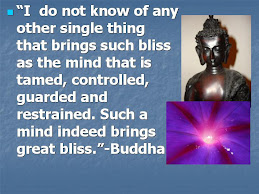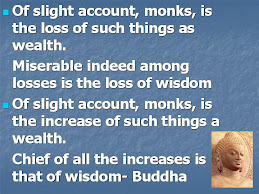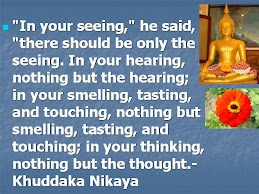
The benefits of meditation have been discussed in previous posts (see below). In this post I have attached two articles that may interest you.
How to Get Smarter, One Breath at a Time
Tuesday, Jan. 10, 2006 How to Get Smarter, One Breath at a TimeBy Lisa Takeuchi Cullen
At 4:30, when most of Wall Street is winding down, Walter Zimmermann begins a high-stakes, high-wire act conducted live before a paying audience. About 200 institutional investors—including airlines and oil companies—shell out up to $3,000 a month to catch his daily webcast on the volatile energy markets, a performance that can move hundreds of millions of dollars. "I'm not paid to be wrong—I can tell you that," Zimmermann says. But as he clicks through dozens of screens and graphics on three computers, he's the picture of focused calm. Zimmermann, 54, watched most of his peers in energy futures burn out long ago. He attributes his brain's enduring sharpness not to an intravenous espresso drip but to 40 minutes of meditation each morning and evening. The practice, he says, helps him maintain the clarity he needs for quick, insightful analysis—even approaching happy hour. "Meditation," he says, "is my secret weapon."Everyone around the water cooler knows that meditation reduces stress. But with the aid of advanced brainscanning technology, researchers are beginning to show that meditation directly affects the function and structure of the brain, changing it in ways that appear to increase attention span, sharpen focus and improve memory.One recent study found evidence that the daily practice of meditation thickened the parts of the brain's cerebral cortex responsible for decision making, attention and memory. Sara Lazar, a research scientist at Massachusetts General Hospital, presented preliminary results last November that showed that the gray matter of 20 men and women who meditated for just 40 minutes a day was thicker than that of people who did not. Unlike in previous studies focusing on Buddhist monks, the subjects were Boston-area workers practicing a Western-style of meditation called mindfulness or insight meditation. "We showed for the first time that you don't have to do it all day for similar results," says Lazar. What's more, her research suggests that meditation may slow the natural thinning of that section of the cortex that occurs with age.The forms of meditation Lazar and other scientists are studying involve focusing on an image or sound or on one's breathing. Though deceptively simple, the practice seems to exercise the parts of the brain that help us pay attention. "Attention is the key to learning, and meditation helps you voluntarily regulate it," says Richard Davidson, director of the Laboratory for Affective Neuroscience at the University of Wisconsin. Since 1992, he has collaborated with the Dalai Lama to study the brains of Tibetan monks, whom he calls "the Olympic athletes of meditation." Using caps with electrical sensors placed on the monks' heads, Davidson has picked up unusually powerful gamma waves that are better synchronized in the Tibetans than they are in novice meditators. Studies have linked this gamma-wave synchrony to increased awareness.Many people who meditate claim the practice restores their energy, allowing them to perform better at tasks that require attention and concentration. If so, wouldn't a midday nap work just as well? No, says Bruce O'Hara, associate professor of biology at the University of Kentucky. In a study to be published this year, he had college students either meditate, sleep or watch TV. Then he tested them for what psychologists call psychomotor vigilance, asking them to hit a button when a light flashed on a screen. Those who had been taught to meditate performed 10% better—"a huge jump, statistically speaking," says O'Hara. Those who snoozed did significantly worse. "What it means," O'Hara theorizes, "is that meditation may restore synapses, much like sleep but without the initial grogginess."Not surprisingly, given those results, a growing number of corporations—including Deutsche Bank, Google and Hughes Aircraft—offer meditation classes to their workers. Jeffrey Abramson, CEO of Tower Co., a Washington-based development firm, says 75% of his staff attend free classes in transcendental meditation. Making employees sharper is only one benefit; studies say meditation also improves productivity, in large part by preventing stress-related illness and reducing absenteeism.Another benefit for employers: meditation seems to help regulate emotions, which in turn helps people get along. "One of the most important domains meditation acts upon is emotional intelligence—a set of skills far more consequential for life success than cognitive intelligence," says Davidson. So, for a New Year's resolution that can pay big dividends at home and at the office, try this: just breathe.
Find this article at:http://www.time.com/time/magazine/article/0,9171,1147167,00.html
How to Get Smarter, One Breath at a Time
Tuesday, Jan. 10, 2006 How to Get Smarter, One Breath at a TimeBy Lisa Takeuchi Cullen
At 4:30, when most of Wall Street is winding down, Walter Zimmermann begins a high-stakes, high-wire act conducted live before a paying audience. About 200 institutional investors—including airlines and oil companies—shell out up to $3,000 a month to catch his daily webcast on the volatile energy markets, a performance that can move hundreds of millions of dollars. "I'm not paid to be wrong—I can tell you that," Zimmermann says. But as he clicks through dozens of screens and graphics on three computers, he's the picture of focused calm. Zimmermann, 54, watched most of his peers in energy futures burn out long ago. He attributes his brain's enduring sharpness not to an intravenous espresso drip but to 40 minutes of meditation each morning and evening. The practice, he says, helps him maintain the clarity he needs for quick, insightful analysis—even approaching happy hour. "Meditation," he says, "is my secret weapon."Everyone around the water cooler knows that meditation reduces stress. But with the aid of advanced brainscanning technology, researchers are beginning to show that meditation directly affects the function and structure of the brain, changing it in ways that appear to increase attention span, sharpen focus and improve memory.One recent study found evidence that the daily practice of meditation thickened the parts of the brain's cerebral cortex responsible for decision making, attention and memory. Sara Lazar, a research scientist at Massachusetts General Hospital, presented preliminary results last November that showed that the gray matter of 20 men and women who meditated for just 40 minutes a day was thicker than that of people who did not. Unlike in previous studies focusing on Buddhist monks, the subjects were Boston-area workers practicing a Western-style of meditation called mindfulness or insight meditation. "We showed for the first time that you don't have to do it all day for similar results," says Lazar. What's more, her research suggests that meditation may slow the natural thinning of that section of the cortex that occurs with age.The forms of meditation Lazar and other scientists are studying involve focusing on an image or sound or on one's breathing. Though deceptively simple, the practice seems to exercise the parts of the brain that help us pay attention. "Attention is the key to learning, and meditation helps you voluntarily regulate it," says Richard Davidson, director of the Laboratory for Affective Neuroscience at the University of Wisconsin. Since 1992, he has collaborated with the Dalai Lama to study the brains of Tibetan monks, whom he calls "the Olympic athletes of meditation." Using caps with electrical sensors placed on the monks' heads, Davidson has picked up unusually powerful gamma waves that are better synchronized in the Tibetans than they are in novice meditators. Studies have linked this gamma-wave synchrony to increased awareness.Many people who meditate claim the practice restores their energy, allowing them to perform better at tasks that require attention and concentration. If so, wouldn't a midday nap work just as well? No, says Bruce O'Hara, associate professor of biology at the University of Kentucky. In a study to be published this year, he had college students either meditate, sleep or watch TV. Then he tested them for what psychologists call psychomotor vigilance, asking them to hit a button when a light flashed on a screen. Those who had been taught to meditate performed 10% better—"a huge jump, statistically speaking," says O'Hara. Those who snoozed did significantly worse. "What it means," O'Hara theorizes, "is that meditation may restore synapses, much like sleep but without the initial grogginess."Not surprisingly, given those results, a growing number of corporations—including Deutsche Bank, Google and Hughes Aircraft—offer meditation classes to their workers. Jeffrey Abramson, CEO of Tower Co., a Washington-based development firm, says 75% of his staff attend free classes in transcendental meditation. Making employees sharper is only one benefit; studies say meditation also improves productivity, in large part by preventing stress-related illness and reducing absenteeism.Another benefit for employers: meditation seems to help regulate emotions, which in turn helps people get along. "One of the most important domains meditation acts upon is emotional intelligence—a set of skills far more consequential for life success than cognitive intelligence," says Davidson. So, for a New Year's resolution that can pay big dividends at home and at the office, try this: just breathe.
Find this article at:http://www.time.com/time/magazine/article/0,9171,1147167,00.html
"The Biology of Joy"
Sunday, Jan. 09, 2005The Biology of JoyBy MICHAEL D. LEMONICK
Richard Davidson was in a lab observing a Buddhist Monk Sink deep into serene meditation when he noticed something that sent his own pulse racing. Davidson, a professor of psychology and psychiatry at the University of Wisconsin, hurriedly double-checked the data streaming to his computer from electrodes attached to the monk's skull, but there was no mistake. Electrical activity in the left prefrontal lobe of the monk's brain was shooting up at a tremendous rate. "It was exciting," Davidson recalls. "We didn't expect to see anything quite that dramatic."Davidson's excitement is all the more significant because he's known by colleagues as the king of happiness research. When he made the discovery five years ago, he had been studying the link between prefrontal-lobe activity and the sort of bliss deep meditators experience. But even for someone with his experience, watching the brain crackle with activity as a person entered a trancelike state was unprecedented. It made clear, says Davidson, who published the research study in the Proceedings of the National Academy of Sciences last fall, that happiness isn't just a vague, ineffable feeling; it's a physical state of the brain--one that you can induce deliberately.That's not all. As researchers have gained an understanding of the physical characteristics of a happy brain, they have come to see that those traitshave a powerful influence on the rest of the body. People who rate in the upper reaches of happiness on psychological tests develop about 50% more antibodies than average in response to flu vaccines, and that, says Davidson, "is a very large difference." Others have discovered that happiness or related mental states like hopefulness, optimism and contentment appear to reduce the risk or limit the severity of cardiovascular disease, pulmonary disease, diabetes, hypertension, colds and upper-respiratory infections as well. According to a Dutch study of elderly patients published in November, those upbeat mental states reduced an individual's risk of death 50% over the study's nine-year duration. Says Laura Kubzansky, a health psychologist at Harvard's School of Public Health, in a masterpiece of understatement: "There's clearly some kind of effect."It makes sense that there should be. Doctors have known for years that clinical depression--the extreme opposite of happiness--can worsen heart disease, diabetes and a host of other illnesses. But the neurochemistry of depression is much better known than that of happiness, mostly because the former has been studied more intensively and for much longer. Until about a decade ago, says Dacher Keltner, a psychologist at the University of California, Berkeley, "90% of emotion research focused on the negative, so there still are all of these interesting questions about the positive state."A growing number of researchers exploring the physiology and neurology of happiness are starting to answer those questions. Perhaps most fundamental of all is what happiness is, in a clinical sense. At this point, nobody can really say with precision. The word happiness, Davidson observes, "is kind of a placeholder for a constellation of positive emotional states. It's a state of well-being where individuals are typically not motivated to change their state. They're motivated to preserve it. It's associated with an active embracing of the world, but the precise characteristics and boundaries have really yet to be seriously characterized in scientific research."Still, subjects can reliably tell researchers when they're feeling good, and two brain-imaging technologies--functional magnetic resonance imaging (MRI), which maps blood flow to active parts of the brain, and electroencephalograms, which sense the electrical activity of neuronal circuits--consistently point to the left prefrontal cortex as a prime locus of happiness.That raises the chicken-and-egg question of whether the prefrontal cortex creates the sensation of happiness or whether it merely reflects one's more general emotional state. Davidson thinks the answer is both: "We're confident that this part of the brain is a proximal cause of at least certain kinds of happiness." That suggests some people are genetically predisposed to be happy by virtue of their busy prefrontal cortexes, and research in infants confirms it. Davidson measured left prefrontal activity in babies less than a year old and then subjected them to a test in which their mothers left the room briefly. "Some babies will just cry hysterically the instant the mom leaves," he says. "Others are more resilient." It turns out that the babies with the higher left prefrontal activity are the ones who don't cry. "We were actually able to predict which infants would cry in response to that brief but significant stress."In short, as parents know instinctively, some babies are just born happy. But neuroscientists have also learned over the past decade that the brain is highly plastic. It rewires itself in response to experience, and that's especially true before the age of puberty. One might naively assume, therefore, that negative experiences might destroy a happy personality--and if they're extreme and frequent enough, that might be true. Davidson has learned, however, that mild to moderate doses of negative experience are beneficial. (In animal studies, he compared groups that had been moderately stressed when young to those that never were and found the former better able to recover from stress as adults. In human studies, in which deliberately inducing stress on kids would be unethical, he based his conclusions on self-reported stories of stressful childhoods.) The reason, he believes, is that stressful events give us practice at bouncing back from unpleasant emotions. They're like an exercise to strengthen our happiness muscles or a vaccination against melancholy.Exactly what is the physical difference, though, between a left prefrontal cortex that is predisposed to happiness and one that isn't? It almost certainly has in part to do with neurotransmitters, the chemicals that ferry signals from one neuron to the next. And while the prefrontal cortex is awash in many neurotransmitters, including dopamine, serotonin, glutamate, GABA and more, Davidson believes dopamine may be especially important. Animal studies have shown that dopamine mediates the transfer of signals associated with positive emotions between the left prefrontal area and the emotional centers in the limbic area of the brain, such as the nucleus accumbens, situated within the ventral striatum. In humans, people with a sensitive version of the receptor that accepts dopamine tend to have better moods, and researchers are actively studying the relationship of dopamine levels to feelings of euphoria and depression.Dopamine pathways may be especially important in aspects of happiness associated with moving toward some sort of goal (monks achieving a meditative state as well as cigarette smokers allowed to light up after 24 hours of deprivation). But other neurochemicals may be more central to other kinds of happiness, including physical pleasure. "People have made progress differentiating the positive feeling you get when you approach a goal, which maps onto dopamine, and the sensory pleasure of enjoying something, which maps onto the opioid system," says Berkeley psychologist Keltner. "We're just beginning to apply a lens to all those parts of the nervous system in which the positive emotions are embodied. This is really neat territory."Among those exploring that territory is Brian Knutson, an assistant professor of psychology and neuroscience at Stanford, who, like Davidson, uses MRI to monitor the brains of test subjects. The mental mode he studies is anticipation. "When people think of happiness," says Knutson, "they think of feeling good, but a big part of happiness is also looking forward to something." Knutson's research was inspired by the classic work of Ivan Pavlov, who trained dogs to salivate at the sound of a bell, which they associated with mealtime.Instead of food, Knutson used money: a small cash payoff if subjects won a video game. "When we looked at their brains just before they got the reward," he says, "we saw this spark that clearly had to do with how positive the idea of making money was." The spark showed up not in the left prefrontal cortex but in what Knutson terms an old section, the nucleus accumbens, located in the subcortex, at the bottom of the brain. The bigger the prize, Knutson found, "the more activation." Knutson believes he is looking at the kind of happy feelings we experience as excitement. The primary focus of his work is to understand the neurophysiology of motivation and decision making--how emotion and reason work together as people make choices. But it could also be a key to mapping out the brain's broader happiness circuitry.Understanding the neurophysiology of feeling good is one aspect of happiness research; another is understanding how positive emotion affects the rest of the body. As with the brain studies, the term happiness is too broad for a rigorous approach, so researchers tend to focus on specific aspects. Harvard psychologist Kubzansky has chosen to study optimism. In a large study she tracked 1,300 men for 10 years and found that heart-disease rates among men who called themselves optimistic were half the rates for men who didn't."It was a much bigger effect than we expected," she says--as big as the difference between smokers and nonsmokers. "We also looked at pulmonary function, since poor pulmonary function is predictive of a whole range of bad outcomes, including premature mortality, cardiovascular disease and chronic obstructive pulmonary disease." Again, optimists did much better. "I'm an optimist," she says, "but I didn't expect results like this."In a separate study, meanwhile, which has been accepted by the journal Health Psychology, Kubzansky, working with Duke psychologist and lead researcher Laura Richman, looked at hopefulness and curiosity--mental states that overlap with optimism in some ways. "We found them to be protective against hypertension, diabetes and upper-respiratory infection," she says. Such protective effects may explain the longevity advantage found in that Dutch study of the elderly--an advantage for happy optimists that persisted even when researchers corrected for diet, education and other factors.Exactly how states of mind affect the body's biochemistry is still far from clear. "We can do some good speculation," says Kubzansky, "based on what we know about anxiety and depression, so there are a couple of places to look in terms of neuroendocrine function and immune inflammatory pathways." One clue: in addition to reporting a positive mood when their left prefrontal cortexes are active, subjects in Davidson's experiments have lower levels of cortisol, a hormone produced by the adrenal gland in response to stress--and cortisol is known to depress immune function. Optimists may simply feel less stress than pessimists and thereby avoid the noxious biochemical cascades that stress is known to trigger. Another likely factor: optimistic, happy types seem to take better care of themselves than sad sacks do. Numerous studies--as well as common sense--suggest that to be the case.In a series of studies begun in 1998, psychologist Robert Emmons of the University of California at Davis has found further evidence that happy people are better at health maintenance. Emmons randomly assigned 1,000 adults to one of three groups. The first group kept daily journals of their moods and rated them on a scale of 1 to 6. The second group did that and listed the things that annoyed or hassled them throughout their day. The third group kept a journal but added an activity that has repeatedly been shown to improve one's sense of satisfaction with life: they were asked to write down every day all the things for which they were grateful.Despite being assigned randomly, the last group not only had the predicted jump in their overall feelings of happiness, says Emmons, but were also found to spend more time exercising, be more likely to have regular medical checkups and routinely take preventive health actions like wearing sunscreen. Overall, the "gratitude" group were promoting better health. "They rate themselves as more energetic, more enthusiastic, more alert," Emmons reports. In short, keeping the diaries contributed to their physical and emotional well-being.Not surprisingly, the advantages were greatest when compared with the group that focused on life's hassles. "People who are grateful tend to view their body a certain way," says Emmons. "They see life as a gift, health as a gift. So they want to take certain measures to preserve it." Reminding yourself of what you're grateful for is a technique open to anyone, but more sophisticated methods of manipulating happiness are showing promise as well. Cognitive-behavior therapy and medication, for example, are used mostly to combat depression, but they may also be useful in enhancing happiness.Such positive results gratify happiness researchers, who haven't been very successful in attracting federal dollars. "I could easily see being spoofed on the Senate floor for whatever award they give for esoteric, needless research," says Keltner. "But as the findings trickle in showing that positive emotions and happiness make your immune system function better, or help you battle disease, or help you live longer, then you're into fundable territory." Thanks to Keltner, Davidson and others, those findings have gained the field a degree of respectability that's long overdue--and that ultimately could make all of us a whole lot happier. --Reported by Dan Cray/ Los AngelesWith reporting by Dan Cray/ Los Angeles
Find this article at: http://www.time.com/time/magazine/article/0,9171,1015863,00.html
Time Magazine Articles on Meditation:


Neurotheologist is one of Time Magazine’s 100 most influential people
Madison Magazine has named Dr. Davidson as their "Person of the Year" in the November 2007 issue.Lab for affective Neuroscience, Research in the News
Mindfulness Research Update: 2008
Jeffrey M. Greeson, Ph.D., M.S.
Previous related posts:
How can mindfulness help?
Do like to be the happiest man on earth?
Do you want to increase your brain thickness?
Can Mindfulness Help Cancer Patients ?








































































1 comment:
Thanks for the post. Im pleased Mindfulness meditation in particular is finding its way into psychological treatment clinics in the mental health field.. I agree it can be correlated with joy and acceptance.
Post a Comment